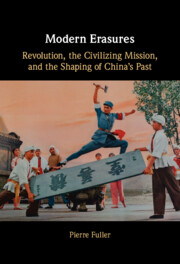Book contents
- Modern Erasures
- Modern Erasures
- Copyright page
- Dedication
- Contents
- Figures and Maps
- Acknowledgments
- Note on the Text
- Introduction
- Part I Seeing and Not Seeing
- 1 Networks into China’s Northwest
- 2 New Culture Lenses onto Rural Life
- 3 Projections onto a “Chinese Screen”
- Part II Revolutionary Memory in Republican China
- Part III Maoist Narratives in the Forties
- Part IV Politics of Oblivion in the People’s Republic
- Conclusion
- Glossary
- Bibliography
- Index
3 - Projections onto a “Chinese Screen”
from Part I - Seeing and Not Seeing
Published online by Cambridge University Press: 31 March 2022
- Modern Erasures
- Modern Erasures
- Copyright page
- Dedication
- Contents
- Figures and Maps
- Acknowledgments
- Note on the Text
- Introduction
- Part I Seeing and Not Seeing
- 1 Networks into China’s Northwest
- 2 New Culture Lenses onto Rural Life
- 3 Projections onto a “Chinese Screen”
- Part II Revolutionary Memory in Republican China
- Part III Maoist Narratives in the Forties
- Part IV Politics of Oblivion in the People’s Republic
- Conclusion
- Glossary
- Bibliography
- Index
Summary
This chapter explores the cultural preconditioning through which many visitors to the East viewed and processed events around them in the early twentieth century. It considers how the messaging and tone found in missionary treatments of Chinese society, which mirrored May Fourth writing in striking ways, added urgency to evangelical work by stressing its morally transformative purpose, something missionary writing shared with revolutionary agitation. On asserting the primacy of Western beneficence and valuation of life, missionaries were joined by more secular and celebrated writers, including Bertrand Russell, Somerset Maugham and Alexis Leger (aka St.-John Perse). In the broader logic of colonialism, the idea that benevolence was practiced or not, or suffering alleviated or not, became a key criterion with which cultures and peoples were categorised in the hierarchy of nations. Chinese writers during May Fourth in turn embraced and internalized such dichotomies in a form of sociological coproduction. In the paradigm to which many reformist writers subscribed, Chinese culture precluded the very idea of assisting strangers or of mitigating social ills in any meaningful way. Western power over the Chinese was thus attributed in part to civic cultures and day-to-day values lacking in Chinese communities.
Keywords
- Type
- Chapter
- Information
- Modern ErasuresRevolution, the Civilizing Mission, and the Shaping of China's Past, pp. 87 - 114Publisher: Cambridge University PressPrint publication year: 2022

